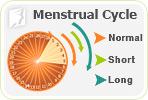In modern day society it has become more and more common for women to start families well into their late 30s and early 40s. Unfortunately this time frame is also when many women begin to experience menopause symptoms such as hot flashes, night sweats, and irregular periods.
Experiencing worry and anxiety about future infertility is common for perimenopausal women, especially among those still hoping to reproduce.
Facts about Irregular Periods and Fertility
If you are nearing traditional menopause age and have experienced irregular periods, keep the following in mind:
You can get pregnant during perimenopause
Menopause is defined as the time when a woman hasn't received a period for 12 consecutive months. Therefore, in the stage preceding this, when your periods are irregular, you can still get pregnant. In the perimenopausal phase, it is also common for women to experience anovulation.It occurs when the ovaries do not release an egg during the menstrual cycle. If this happens you may experience bleeding but not ovulation.
Research suggests that by the age of 40, a woman's chance of getting pregnant during her menstrual cycle is just 5%. For more information about fertility and irregular periods, keep reading to learn about ways to improve chances of fertility.
Ways menopausal women can improve chances of becoming pregnant
Most experts suggest that if you are over 35 and trying to get pregnant, you should schedule an appointment with a family care physician after trying unsuccessfully for six months. The meeting will allow you to discuss additional treatments that can improve your chances of fertility in the perimenopausal phase.
Herbal remedies
Naturally-occurring herbs may increase your fertility by treating hormonal imbalance in perimenopausal women. Two types of herbs are used to treat hormonal imbalances and menopausal symptoms:phytoestrogenic and hormone-regulating supplements.
Phytoestrogenic herbs (e.g., dong quai) treat infertility by releasing compounds into the body that mimic the effects of estrogen and aid the restoration of hormonal balance.Hormone-regulating supplements treat infertility by naturally boosting the body's production of essential hormones. Click here for more information about treatments for irregular periods.
In Vitro Fertilization (IVF)
During IVF, fertility drugs are injected into the female body in order to stimulate the ovaries. Once the healthy eggs have been developed and retrieved, they are placed with male sperm in a laboratory incubator to allow for fertilization.
According to The American Pregnancy Association, IVF is 15-20% effective for women ages 38 - 40 and only 6 - 10% effective for women over 40.
If you are considering IVF, be sure to talk with your doctor about the risks of IVF, which include severe nausea and vomiting, severe abdominal pain, and shortness of breath.
Learning more about irregular periods as a symptom of menopause is important for your overall well-being. Click here for an overview of the symptoms, causes, and treatments for irregular periods.
Sources
- Hutchinson, Susan M.D. "The Stages of a Woman's Life: Menstruation, Pregnancy, Nursing, Perimenopause, Menopause". November 2007.
- Love, Susan M.D. Menopause and Hormone Book. New York: Three Rivers Press, 2003.
- BMJ Group. "Menopause: What is it?" Patient Leaflet. 20




